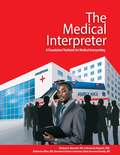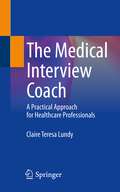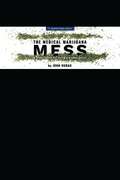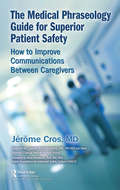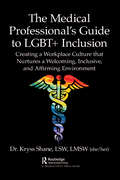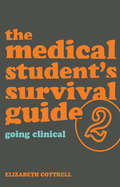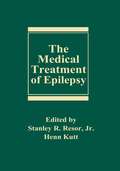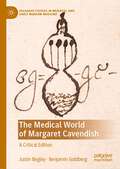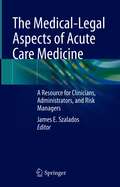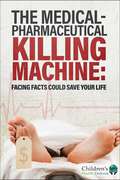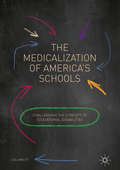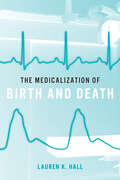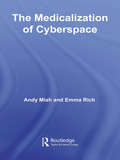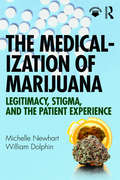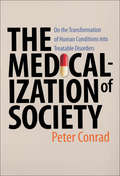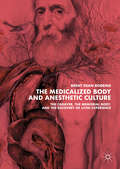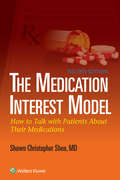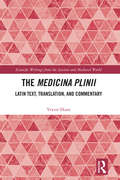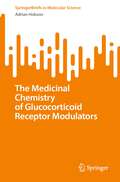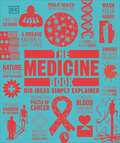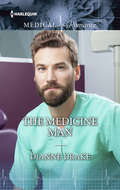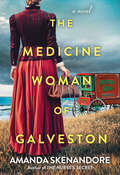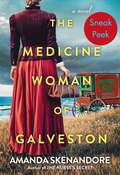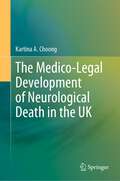- Table View
- List View
The Medical Interpreter: A Foundation Textbook for Medical Interpreting
by Marjory Bancroft Sofia Garcia Beyaert Katharine Allen Giovanna Carriero-Contreras Denis Socarras-EstradaThis book can also be used as the basis for a foundation program for the training and education of medical interpreters. It is designed for use both in short training programs (40 to 100 hours) and university and college programs lasting one or two semesters.
The Medical Interview Coach: A Practical Approach for Healthcare Professionals
by Claire Teresa LundyThis short practical text uses a coaching approach to develop the reader’s interview skills. With increasing competition, doctors and healthcare professionals need to prepare well for success at interview. The author has successfully coached colleagues in the run-up to interviews using this approach. Readers will learn how to structure responses to reflect their personality, knowledge and experience. This approach encourages candidates to craft their responses in a compelling narrative that will help them stand out. Healthcare organisations are increasingly looking at assessment of values and behaviours as part of the recruitment process. This represents a shift from a more clinical competency-based approach and requires additional preparation for interview. This book will help coach clinicians to describe their own experience in this context. The author is a practicing clinician, coach and led development of a clinical leadership and quality improvement training program for doctors and dentists and training in the UK. This book is aimed at doctors and healthcare professionals in training positions and those moving to a new role.
The Medical Marijuana Mess: A Prescription for Fixing a Broken Policy
by John HudakThe uncertainty and inconsistency surrounding federal and state laws for medical marijuana use, distribution, and research is placing unnecessary obstacles in the way of suffering patients, their families, and the people trying to help them.In The Medical Marijuana Mess, senior fellow John Hudak illustrates the extreme dysfunction of medical marijuana policy through two different narratives: the Collins', who make the painful choice to split up their family in order to treat their daughter's debilitating epilepsy with CBD oil, and Rabbi Jeffrey Kahn, a medical marijuana dispensary owner who encountered unimaginable obstacles, scrutiny, and personal liability in order to help other patients in need.
The Medical Phraseology Guide for Superior Patient Safety: How to Improve Communications Between Caregivers
by Jerome CrosIn patient care, inaccuracy often leads to error: the patient does not receive the right medication, the nurse is mistaken about the patient, the doctor is mistaken about the condition. Human error in care is now a well-known occurrence, and medicine has borrowed many tools from aviation to improve safety, such as simulation training, limitation of working time, use of checklists, and so forth. All these tools contribute to improving human factors in healthcare. Often due to the lack of communication between professionals, healthcare accidents are avoidable. The only solution is the standardization of communication through phraseology. But make no mistake, the subject of communication is vast and much more complex to teach than we imagine. Communication is not only an exchange of words, of meaning, of a sender-receiver scheme; it also carries the essence of all social and cooperative life by its tone, by its moment, by the listening and availability it demands from the other person, by the words chosen, by those not said voluntarily, and those referred to as “tacit” (what we no longer need to say but the other guesses). The Medical Phraseology Guide for Superior Patient Safety: How to Improve Communications Between Caregivers, through concrete and proven examples, gives readers the keys to improve communication with their healthcare colleagues. The author proposes 26 rules that are detailed and easy applicable in everyday life. These rules are inspired by the tools and checklist developed and used by commercial airline pilots. Today, more than ever, caregivers face new situations, and they have to adapt to caring for an unusual number of patients, sometimes in new environments. Given this new environment, it becomes clear that teamwork and communication are indispensable tools for improving efficiency and safety in patient care.
The Medical Professional's Guide to LGBT+ Inclusion: Creating a Workplace Culture that Nurtures a Welcoming, Inclusive, and Affirming Environment
by Kryss ShaneThe rates of medical bullying, absences by LGBT+ professionals due to lack of safety in the workplace, and subsequent suicidality for LGBT+ youth and adults are exponentially higher than for non-LGBT+ youth and adults. As a result, many LGBT+ patients and professionals are suffering needlessly, and many business leaders are unsure of what to do. This book solves that problem. Featuring real-life situations and scenarios, a glossary, and further resources, this book enables professionals in a variety of business roles to integrate foundational concepts into their everyday interactions with potential and current employees to create an overall medical workplace culture that nurtures a welcoming, inclusive, and affirming environment for all. This book can be utilized by independent readers, department teams, and entire medical corporations reading experiences. Setting out best practices and professional guidance for creating an LGBT+ inclusive medical workplace, this approachable and easy-to-follow book guides medical leaders and anyone working in a medical facility toward appropriate and proven ways to create safer working environments, update workplace policies, enhance hiring and staff retention protocols, and better support LGBT+ employees in the workplace as well as for LGBT+ patient experiences. The real-life scenarios are a unique feature of this book. While many offer information, this book is practical and requires active engagement with the material for the reader. The scenarios offer the reader the opportunity to try out the foundational knowledge they obtained in earlier chapters by giving real business place experiences that others have been challenged by. After reading the scenario, there are intentional pointed thought questions, which can be used for discussion if the book is read in groups or teams. This encourages teamwork and shared learning. Then, readers will receive guidance from America’s leading LGBT+ expert, who uses her 25+ years of experience to guide the reader as if they were receiving individualized guidance right from her to them!
The Medical Student's Survival Guide: Bk. 2
by David Mitchell Elizabeth CottrellTo the unsuspecting, wearing a stethoscope could not be more easy. You pick it up, place it around your neck and...hey presto...you look like you know what you are doing and people think you are a doctor...This is the no-nonsense guide to the reality of medical student life. Everything you need to know is here. What are my chances of delivering a baby? How many questions should I ask? How do I insert a nasogastric tube without the patient knowing it's my first time? Where will I live when I'm on clinical rounds? Why can't I wear trainers? Will patients like me? What is a patient's 'pack year' history? How do I break bad news? How can I get more sleep? And much, much more.
The Medical Treatment of Epilepsy
by Stanley R. Resor, Jr. and Henn KuttThis book is a comprehensive guide to the medical treatment of epilepsy and written for physicians in practice and those in training who take care of patients with seizures. It presents a review of every aspect of treatment that are considered prior to referring a patient for evaluation.
The Medical World of Margaret Cavendish: A Critical Edition (Palgrave Studies in Medieval and Early Modern Medicine)
by Benjamin Goldberg Justin BegleyThis book is the first transcription and extensive commentary on a fascinating but almost entirely overlooked manuscript compilation of medical recipes and letters, which is held in the University of Nottingham. Collected by the Marquess and Marchioness of Newcastle, William and Margaret Cavendish, during the 1640s and 1650s, this manuscript features letters of advice, recipes, and sundry philosophical and medical reflections by some of the most formidable and influential physicians, philosophers, and courtly scholars of the early seventeenth century. These include “Europe’s physician” Theodore de Mayerne, the adventurer and courtier Kenelm Digby, and the natural philosopher, poet, and playwright Margaret Cavendish. While the transcription and accompanying annotations will allow a diverse array of readers to appreciate the manuscript for the first time, the introduction situates the Cavendishes’ recipe collecting habits, medical preoccupations, natural philosophical views, and politics within their social, cultural, and philosophical contexts, and draws out some of the most significant implications of this important document.
The Medical-Legal Aspects of Acute Care Medicine: A Resource for Clinicians, Administrators, and Risk Managers
by James E. SzaladosThe Medical-Legal Aspects of Acute Care Medicine: A Resource for Clinicians, Administrators, and Risk Managers is a comprehensive resource intended to provide a state-of-the-art overview of complex ethical, regulatory, and legal issues of importance to clinical healthcare professionals in the area of acute care medicine; including, for example, physicians, advanced practice providers, nurses, pharmacists, social workers, and care managers. In addition, this book also covers key legal and regulatory issues relevant to non-clinicians, such as hospital and practice administrators; department heads, educators, and risk managers. This text reviews traditional and emerging areas of ethical and legal controversies in healthcare such as resuscitation; mass-casualty event response and triage; patient autonomy and shared decision-making; medical research and teaching; ethical and legal issues in the care of the mental health patient; and, medical record documentation and confidentiality. Furthermore, this volume includes chapters dedicated to critically important topics, such as team leadership, the team model of clinical care, drug and device regulation, professional negligence, clinical education, the law of corporations, tele-medicine and e-health, medical errors and the culture of safety, regulatory compliance, the regulation of clinical laboratories, the law of insurance, and a practical overview of claims management and billing. Authored by experts in the field, The Medical-Legal Aspects of Acute Care Medicine: A Resource for Clinicians, Administrators, and Risk Managers is a valuable resource for all clinical and non-clinical healthcare professionals.
The Medical-Pharmaceutical Killing Machine: Facing Facts Could Save Your Life
by Children's Health DefenseMedical and pharmaceutical history is replete with examples of dangerous interventions that have poisoned, injured, or killed. However, events since 2020 have attracted attention as never before to medicine&’s potential to be both lethal and malevolent. In The Medical-Pharmaceutical Killing Machine, Children&’s Health Defense situates current perils in their broader context with the aim of helping readers understand how to protect themselves and their loved ones. In the Greek Trojan War saga, the god Apollo ensured that Cassandra&’s prophecies would never be believed, with disastrous consequences. As recounted in the book, modern medicine, too, has produced its fair share of &“medical Cassandras&”—doctors and writers who have tried to warn the public about medicine&’s life-threatening underbelly, generally to little avail. A chapter dedicated to nine of these medical skeptics, beginning with Ivan Illich and his coining of the term &“iatrogenesis&” to describe adverse outcomes caused by doctors, weaves a powerful portrait of harms regularly denied and ignored, with those making the claims typically marginalized and &“canceled.&” The book shows that there is no shortage of tools in the killing machine arsenal. One chapter highlights the mRNA vaccine technology inaugurated with COVID, illustrating how this new mechanism for iatrogenesis is inflicting novel forms of toxicity, not all of which are yet understood. Another chapter about assisted suicide and euthanasia describes the chilling global proliferation of policies and propaganda promoting those practices for vulnerable populations that include babies, children, people diagnosed with autism, and the mentally ill. The book also describes factors that make it possible for the killing machine to continue operating with impunity, including the ascendance of an &“evidence-based medicine&” juggernaut, medical gaslighting, and a ballooning global enforcement infrastructure. Nor does it shy away from confronting what some now characterize as &“iatrogenocide&”; a chapter asking &“Why Do They Do It?&” considers money, prestige, and control as three possible answers. Ultimately, it is only by acknowledging the long-standing reality of an all-too-effective medical-pharmaceutical killing machine that people can learn to dodge the threats and work toward building a different model that prioritizes life and genuine health.
The Medicalization of America's Schools
by Joel MachtThis book challenges the validity of ADHD, learning disabilities, and dyslexia as meaningful special education "categories" and critically examines the misplaced medical model from which they are derived. The presumption that these disabilities cause school-related problems detracts from identifying factors within the classroom that create and maintain a child's underachievement and disruptive behavior. Moreover, when the disability is finally named, it provides no functional information that translates into effective coping strategies. Macht delves into the misunderstood structure of these disabilities, pointing out that they are not verifiable disabilities but weak constructs that poorly describe each child's uniqueness. Finally, he provides an alternative model based on children's strengths rather than their deficiencies, and presents strategies that advance school-related success.
The Medicalization of Birth and Death
by Lauren K. HallImproving how individuals give birth and die in the United States requires reforming the regulatory, reimbursement, and legal structures that centralize care in hospitals and prevent the growth of community-based alternatives.In 1900, most Americans gave birth and died at home, with minimal medical intervention. By contrast, most Americans today begin and end their lives in hospitals. The medicalization we now see is due in large part to federal and state policies that draw patients away from community-based providers, such as birth centers and hospice care, and toward the most intensive and costliest kinds of care. But the evidence suggests that birthing and dying people receive too much—even harmful—medical intervention.In The Medicalization of Birth and Death, political scientist Lauren K. Hall describes how and why birth and death became medicalized events. While hospitalization provides certain benefits, she acknowledges, it also creates harms, limiting patient autonomy, driving up costs, and causing a cascade of interventions, many with serious side effects. Tracing the regulatory, legal, and financial policies that centralize care during birth and death, Hall argues that medicalization reduces competition, stifles innovation, and prevents individuals from accessing the most appropriate care during their most vulnerable moments. She also examines the profound implications of policy-enforced medicalization on informed consent and shows how medicalization challenges the healthcare community's most foundational ethical commitments.Drawing on interviews with medical and nonmedical healthcare providers, as well as surveys of patients and their families, Hall provides a broad overview of the costs, benefits, and origins of medicalized birth and death. The Medicalization of Birth and Death is required reading for academics, patients, providers, policymakers, and anyone else interested in how policy shapes healthcare options and limits patients and providers during life's most profound moments.
The Medicalization of Cyberspace
by Andy Miah Emma RichThe entire infrastructure and culture of medicine is being transformed by digital technology, the Internet and mobile devices. Cyberspace is now regularly used to provide medical advice and medication, with great numbers of sufferers immersing themselves within virtual communities. What are the implications of this medicalization of cyberspace for how people make sense of health and identity? The Medicalization of Cyberspace is the first book to explore the relationship between digital culture and medical sociology. It examines how technology is redefining expectations of and relationships with medical culture, addressing the following questions: How will the rise of digital communities affect traditional notions of medical expertise? What will the medicalization of cyberspace mean in a new era of posthuman enhancements? How should we regard hype and exaggeration about science in the media and how can this encourage public engagement with bioethics? This book looks at the complex interactions between health, medicalization, cyberculture, the body and identity. It addresses topical issues, such as medical governance, reproductive rights, eating disorders, Web 2.0, and perspectives on posthumanism. It is essential reading for healthcare professionals and social, philosophical and cultural theorists of health.
The Medicalization of Marijuana: Legitimacy, Stigma, and the Patient Experience
by Michelle Newhart William DolphinMedical marijuana laws have spread across the U.S. to all but a handful of states. Yet, eighty years of social stigma and federal prohibition creates dilemmas for patients who participate in state programs. The Medicalization of Marijuana takes the first comprehensive look at how patients negotiate incomplete medicalization and what their experiences reveal about our relationship with this controversial plant as it is incorporated into biomedicine. Is cannabis used similarly to other medicines? Drawing on interviews with midlife patients in Colorado, a state at the forefront of medical cannabis implementation, this book explores the practical decisions individuals confront about medical use, including whether cannabis will work for them; the risks of registering in a state program; and how to handle questions of supply, dosage, and routines of use. Individual stories capture how patients redefine and reclaim cannabis use as legitimate—individually and collectively—and grapple with an inherently political identity. These experiences help illustrate how stigma, prejudice, and social change operate. By positioning cannabis use within sociological models of medical behavior, Newhart and Dolphin provide a wide-reaching, theoretically informed analysis of the issue that expands established concepts and provides new insight on medical cannabis and how state programs work.
The Medicalization of Society: On the Transformation of Human Conditions into Treatable Disorders
by Peter ConradOver the past half-century, the social terrain of health and illness has been transformed. What were once considered normal human events and common human problems—birth, aging, menopause, alcoholism, and obesity—are now viewed as medical conditions. For better or worse, medicine increasingly permeates aspects of daily life.Building on more than three decades of research, Peter Conrad explores the changing forces behind this trend with case studies of short stature, social anxiety, "male menopause," erectile dysfunction, adult ADHD, and sexual orientation. He examines the emergence of and changes in medicalization, the consequences of the expanding medical domain, and the implications for health and society. He finds in recent developments—such as the growing number of possible diagnoses and biomedical enhancements—the future direction of medicalization. Conrad contends that the impact of medical professionals on medicalization has diminished. Instead, the pharmaceutical and biotechnical industries, insurance companies and HMOs, and the patient as consumer have become the major forces promoting medicalization. This thought-provoking study offers valuable insight into not only how medicalization got to this point but also how it may continue to evolve.
The Medicalized Body and Anesthetic Culture: The Cadaver, The Memorial Body, And The Recovery Of Lived Experience
by Brent Dean RobbinsThis book examines how modern medicine’s mechanistic conception of the body has become a defense mechanism to cope with death anxiety. Robbins draws from research on the phenomenology of the body, the history of cadaver dissection, and empirical research in terror management theory to highlight how medical culture operates as an agent which promotes anesthetic consciousness as a habit of perception. In short, modern medicine’s comportment toward the cadaver promotes the suppression of the memory of the person who donated their body. This suppression of the memorial body comes at the price of concealing the lived, experiential body of patients in medical practice. Robbins argues that this style of coping has influenced Western culture and has helped to foster maladaptive patterns of perception associated with experiential avoidance, diminished empathy, death denial, and the dysregulation of emotion.
The Medication Interest Model: How to Talk With Patients About Their Medications
by Shawn Christopher SheaPublisher's Note: Products purchased from 3rd Party sellers are not guaranteed by the Publisher for quality, authenticity, or access to any online entitlements included with the product. This pioneering book on the clinician-patient alliance - written in a fast-paced, highly enjoyable writing style - shows medical, nursing, physician assistant, and clinical pharmacy students the importance of the principles behind shared decision making and how to transform those principles into clinical practice. Shawn Christopher Shea, MD, an internationally respected author, has a superb ability to perceive the complexities of clinical interviewing as applied to shared decision making, while creating frameworks and interviewing techniques that illuminate, clarify, and simplify those complexities so that young clinicians can immediately apply them. This book demonstrates the art of enhancing the therapeutic alliance by addressing one of the most, if not the, most important of interviewing tasks with regard to achieving successful healing: collaboratively talking with patients about their medications and effectively enhancing their medication adherence.
The Medicina Plinii: Latin Text, Translation, and Commentary (Scientific Writings from the Ancient and Medieval World)
by Yvette HuntThis book presents the first ever English translation of the Medicina Plinii, one of the most influential books of applied medicine and self-medication in Late Antiquity and the Middle Ages.The work, which predates AD 400, was created as a quick reference work for travellers, and became and remained highly influential, as witnessed by frequent references to it and by various later adaptations. Only the rise of scientific medicine and pharmacology led to its demise and confinement in a small corner of specialist studies. It presents more than 1,150 healing methods and recipes mainly adapted from the encyclopedic Natural History of Pliny the Elder, arranged from the patient’s head to foot in order that readers could quickly find treatments for their diseases. The Medicina Plinii is of dual interest to present-day scholarship: The book is a monument for the practical application of classical knowledge which has recently found lively interest in the history of science and medicine. At the same time the Medicina Plinii provides a fascinating insight into the realities of the world of Late Antiquity, and into the anxieties of the people living in the vast Roman empire.This book will be of particular interest to scholars and advanced students in the History of Science and Medicine, along with a wider audience interested in medicine, and in life in the Roman world.
The Medicinal Chemistry of Glucocorticoid Receptor Modulators (SpringerBriefs in Molecular Science)
by Adrian HobsonThis book covers the design and development of glucocorticoid receptor modulators (GRM) from cortisol to antibody-drug conjugate payloads over the last 70 years. The author starts with an introduction to the background of glucocorticoid receptor modulators as potential therapeutic modalities. This is followed by seven chapters in which he collates and discusses the medicinal chemistry journey of GRMs, reviewing topics such as cortisol-based glucocorticoids, the different approaches that have been pursued to enable chronic dosing of GRM compounds by inactivation in plasma and the liver, the application of prodrugs to GRMs, selective GRMs, targeted delivery of GRMs using polymers and nanoparticles, and rational drug design approaches applied in the development of GRMs. Particular attention is given to the development of glucocorticoid receptor modulators as immunology antibody-drug conjugate payloads. In the book’s final chapter, the author critiques the medicinal chemistry progress made since the discovery of cortisone and the promise of the latest antibody-drug conjugates that release a GRM payload. In this book, readers will also find an overview of the X-ray structures of glucocorticoid receptor antagonists and a list of all the earlier reviews that cover part of the medicinal chemistry story of GRM collated by keywords organized in a table. With several examples of crystal structures and molecular modeling, this book illustrates the huge effort by multiple companies and research groups to develop glucocorticoid receptor modulators. Professionals and scholars alike will find it a handy tool, and appreciate the latest research findings that it presents.
The Medicine Book (DK Big Ideas)
by DKLearn about astonishing medical breakthroughs and discoveries in The Medicine Book.Part of the fascinating Big Ideas series, this book tackles tricky topics and themes in a simple and easy to follow format. Learn about Medicine in this overview guide to the subject, great for novices looking to find out more and experts wishing to refresh their knowledge alike! The Medicine Book brings a fresh and vibrant take on the topic through eye-catching graphics and diagrams to immerse yourself in. This captivating book will broaden your understanding of Medicine, with:- More than 100 ground-breaking ideas in this field of science- Packed with facts, charts, timelines and graphs to help explain core concepts- A visual approach to big subjects with striking illustrations and graphics throughout- Easy to follow text makes topics accessible for people at any level of understandingThe Medicine Book is a captivating introduction to the crucial breakthroughs in this science, aimed at adults with an interest in the subject and students wanting to gain more of an overview. Here you&’ll discover more than 90 amazing medical discoveries through exciting text and bold graphics.Your Medical Questions, Simply ExplainedThis fresh new guide explores the discoveries that have shaped our modern-day understanding of medicine and helped us protect and promote our health. If you thought it was difficult to learn about the important milestones in medical history The Medicine Book presents key information in an easy to follow layout. Learn about medical science&’s response to new challenges - such as COVID-19, and ancient practices like herbal medicine and balancing the humors - through superb mind maps and step-by-step summaries.The Big Ideas SeriesWith millions of copies sold worldwide, The Medicine Book is part of the award-winning Big Ideas series from DK. The series uses striking graphics along with engaging writing, making big topics easy to understand.
The Medicine Man
by Dianne DrakeChayton Ducheneaux turned his back on his Sioux roots for life as a high-powered Chicago surgeon. Wealthy, sophisticated and handsome, Chay has the world at his feet--and he'd never give it up to return home. But then Chay meets the reservation doctor, Joanna Killian. Single-handedly caring for thousands of people across hundreds of miles of wilderness, she's dedicated, exhausted, determined...beautiful. And as the attraction between them grows, Chay learns what being a doctor--and a man--is really about.
The Medicine Show: Consumer Union's Practical Guide to some Everyday Health Problems and Health Products
by The Editors of Consumer ReportsMedical advice on common health problems, facts about popular brand-name remedies, advice on buying prescription drugs, choosing a doctor and a hospital, what to have (and not have) in your medicine cabinet
The Medicine Woman of Galveston
by Amanda SkenandoreA downtrodden female doctor takes up with a traveling medicine show to support her disabled son, joining a German giantess, a bowlegged musician, an indentured Creek poet, and a handsome tinker under the thumb of a charismatic but menacing swindler on a collision course with the deadliest natural disaster in American history – the Galveston Hurricane of 1900. Readers of Christina Baker Kline, Sandra Dallas, and Sara Donati will be captivated by this story of medical historical fiction by Amanda Skenandore, registered nurse and acclaimed author of The Nurse&’s Secret and The Second Life of Mirielle West. Once a trailblazer in the field of medicine, Dr. Tucia Hatherley hasn&’t touched a scalpel or stethoscope since she made a fatal mistake in the operating theater. Instead, she works in a corset factory, striving to earn enough to support her disabled son. When even that livelihood is threatened, Tucia is left with one option—to join a wily, charismatic showman named Huey and become part of his traveling medicine show. Her medical license lends the show a pretense of credibility, but the cures and tonics Tucia is forced to peddle are little more than purgatives and bathwater. Loathing the duplicity, even as she finds uneasy kinship with the other misfit performers, Tucia vows to leave as soon as her debts are paid and start a new life with her son—if Huey will ever let her go. When the show reaches Galveston, Texas, Tucia tries to break free from Huey, only to be pulled even deeper into his schemes. But there is a far greater reckoning ahead, as a September storm becomes a devastating hurricane that will decimate the Gulf Coast—and challenge Tucia to recover her belief in medicine, in the goodness of others—and in herself.
The Medicine Woman of Galveston: Sneak Peek
by Amanda SkenandoreBe one of the first to read this sneak preview sample edition!Caught in the great Galveston Hurricane of 1900, a female doctor who&’s joined a traveling medicine show to support her disabled son is forced to weather the storm and its aftermath in a town hostile to the troupe&’s unconventional ways but desperate for their help. Readers of Ellen Marie Wiseman, Sandra Dallas, and Sara Donati will be captivated by this story of medical historical fiction by Amanda Skenandore, registered nurse and acclaimed author of The Nurse&’s Secret and The Second Life of Mirielle West.Once a trailblazer in the field of medicine, Dr. Tucia Hatherley hasn&’t touched a scalpel or stethoscope since she made a fatal mistake in the operating theater. Instead, she works in a corset factory, striving to earn enough to support her disabled son. When even that livelihood is threatened, Tucia is left with one option—to join a wily, charismatic showman named Huey and become part of his traveling medicine show.Her medical license lends the show a pretense of credibility, but the cures and tonics Tucia is forced to peddle are little more than purgatives and bathwater. Loathing the duplicity, even as she finds uneasy kinship with the other misfit performers, Tucia vows to leave as soon as her debts are paid and start a new life with her son—if Huey will ever let her go.When the show reaches Galveston, Texas, Tucia tries to break free from Huey, only to be pulled even deeper into his schemes. But there is a far greater reckoning ahead, as a September storm becomes a devastating hurricane that will decimate the Gulf Coast—and challenge Tucia to recover her belief in medicine, in the goodness of others—and in herself.
The Medico-Legal Development of Neurological Death in the UK
by Kartina A. ChoongDiagnosis of death by neurological criteria (DNC) is a construct which has been part of the British medico-legal landscape for nearly half a century. This book examines the factors behind its emergence, and discusses the various changes that took place in the last few decades that culminated in the current definition and clinical criteria for determining brain-based death. It highlights the continuities and discontinuities in practice, and the impact they have on the issue of withdrawal of mechanical ventilation in intensive care units and on the field of organ transplantation. The book also explores the law’s response to the introduction and development of DNC in clinical practice. It demonstrates how the legitimacy of the definition and criteria used by the medical profession were forged in the courtroom rather than in Parliament. It documents why case law were introduced in court, and assesses whether organ donation was a consideration in the deliberations. It will be emphasised that courts have given insufficient consideration to requests made in recent cases to consider a broader range of methods to determine death. Those pleas were made on the grounds that the definition and criteria used in the UK are dissimilar to those used in other jurisdictions that also adopt DNC; and that faith communities have a different understanding of death. By taking a close look at those other approaches before highlighting the inherent limitations of the courtroom as the forum that confers DNC its legitimacy, the book puts forward the argument that the democratic process should be engaged.
